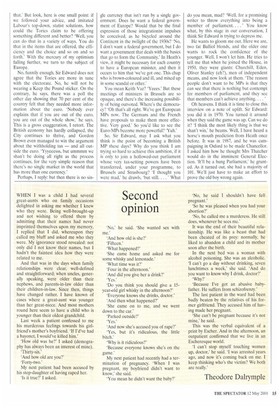Second opinion
WHEN I was a child I had several great-aunts who on family occasions delighted in asking me whether I knew who they were. Being well-brought-up and not wishing to offend them by admitting that their names had never imprinted themselves upon my memory, I replied that I did, whereupon they called my bluff and asked me who they were. My ignorance stood revealed: not only did I not know their names, but I hadn't the faintest idea how they were related to me.
And that was in the days when family relationships were clear, well-defined and straightforward; when uncles, generally speaking, were older than their nephews, and parents-in-law older than their children-in-law. Since then, things have changed rather. I have known of cases where a great-aunt was younger than her great-niece. And most mothers round here seem to have a child who is younger than their oldest grandchild.
Last week a patient confessed to me his murderous feelings towards his girlfriend's mother's boyfriend. 'If I'd've had a bayonet, I would've killed him.'
'How old was he?' I asked (demography has always been an interest of mine). 'Thirty-six.'
'And how old are you?'
'Forty-two.'
My next patient had been accused by his step-daughter of having raped her.
'Is it true?' I asked. 'No,' he said. 'She wanted sex with me.'
'And how old is she?'
'Fifteen.'
'What happened?'
She came home and asked me for some whisky and lemonade.'
'What time was it?'
'Four in the afternoon.'
'And did you give her a drink?'
'Yes.'
'Do you think you should give a 15 year,old girl whisky in the afternoon?'
'Everyone knows she drinks, doctor.'
'And then what happened?'
'She came on to me, and we went down to the car.'
'Parked outside?'
'Yes.'
'And now she's accused you of rape?'
'Yes, but it's ridiculous, the little bitch.'
'Why is it ridiculous?'
'Because everyone knows she's on the game.'
My next patient had recently had a ter
mination of pregnancy. 'When I was
pregnant, my boyfriend didn't want to know,' she said.
'You mean he didn't want the baby?' 'No, he said I shouldn't have fell pregnant.'
'So he was pleased when you had your abortion?'
'No, he called me a murderess. He still does, whenever he sees me.'
It was the end of their beautiful relationship. He was like a beast that had been cheated of its prey: normally, he liked to abandon a child and its mother soon after the birth.
In the next bed was a woman with alcohol poisoning. She was an alcoholic. 'I can't go a day without drinking, seven lunchtimes a week,' she said. 'And do you want to know why I drink, doctor?'
'Why?'
'Because I've got an abusive babyfather. He suffers from schizofrenzy.'
The last patient in the ward had been badly beaten by the relatives of his former girlfriend. They accused him of having made her pregnant.
'She can't be pregnant because it's not mine,' he said.
This was the verbal equivalent of a print by Escher. And in the afternoon, an outpatient confirmed that we live in an Escheresque world.
'I can't stop myself touching women up, doctor,' he said. 'I was arrested years ago, and now it's coming back on me. I keep thinking who's the victim? We both are really.'
Theodore Dalrymple


































































 Previous page
Previous page